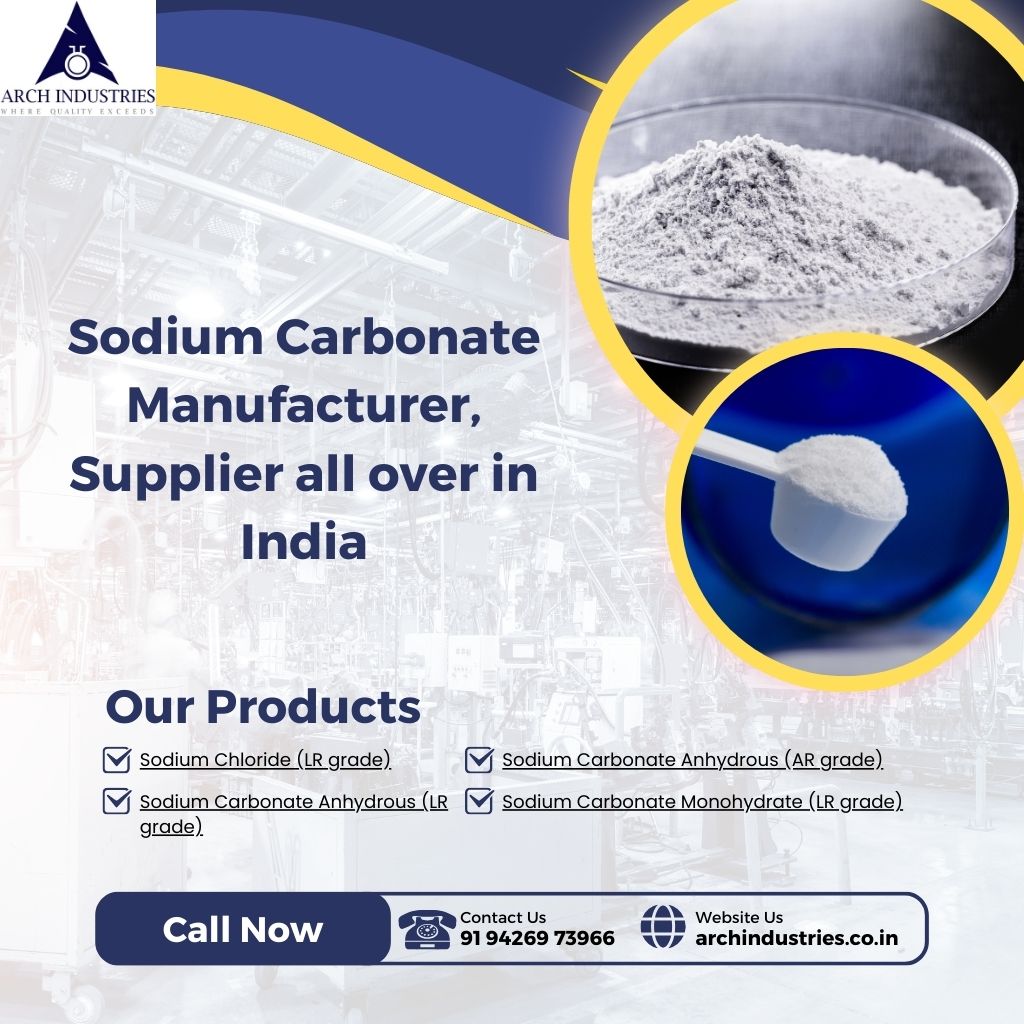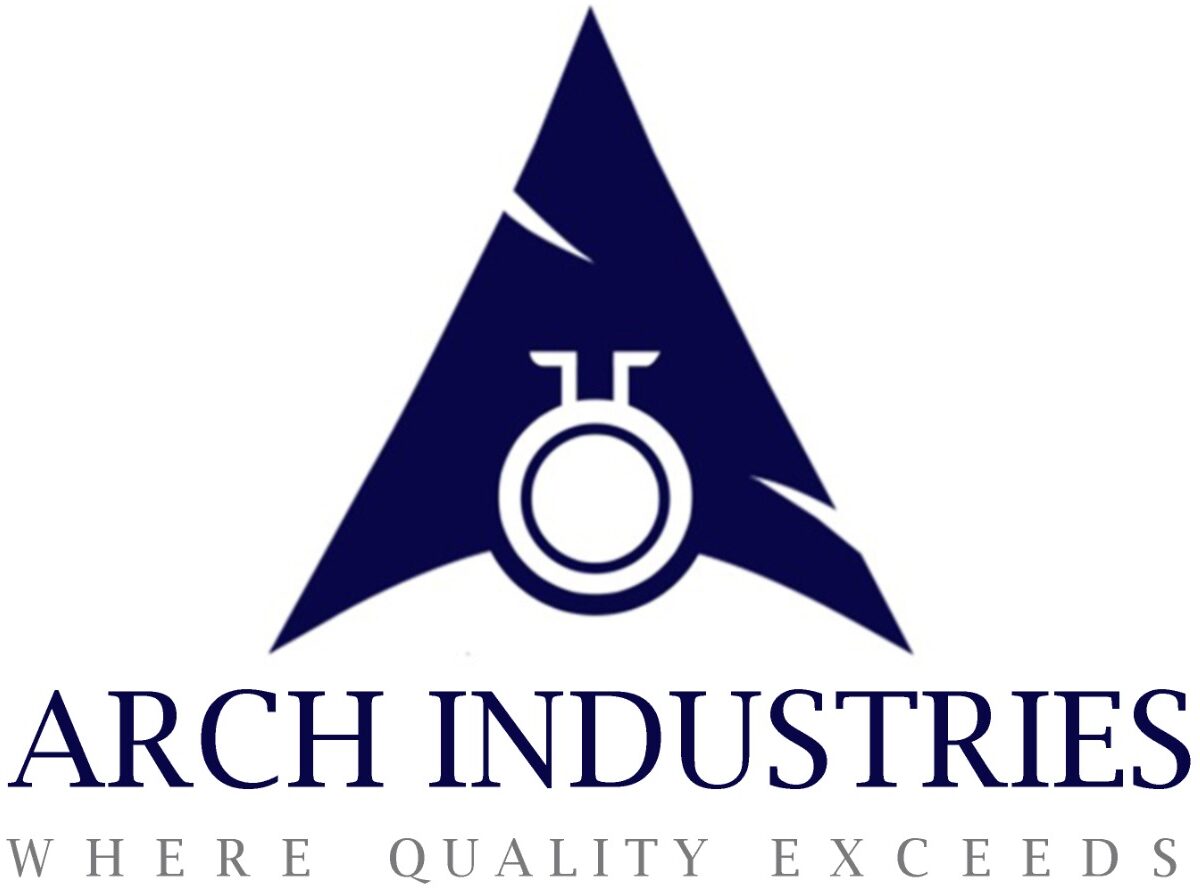Top Sodium Carbonate Manufacturer In India

Top Sodium Carbonate Manufacturer In India
Sodium carbonate, commonly known as soda ash or washing soda, is a versatile chemical compound used in various industries, from glass manufacturing to pharmaceuticals. When it comes to its application in sensitive fields like pharmaceuticals, laboratory analysis, and food, the purity and quality of sodium carbonate are critical.
These requirements are categorized into different grades, each suited for specific purposes. This blog post will explore the differences between Sodium Carbonate LR Grade, AR Grade, IP Grade, BP Grade, USP Grade, and Pharma Grade.
If you are looking for best sodium carbonate manufacturers in india Arch Industry is available for you to supply all over the india.
Sodium Carbonate LR (Laboratory Reagent) Grade
Definition:
- LR grade sodium carbonate is used primarily in laboratory settings where high purity is required but not as stringent as AR grade.
Purity:
- Typically, this grade has a purity of about 99.5%.
Uses:
- Suitable for general laboratory use, including qualitative and semi-quantitative analyses.
- It is often used in educational settings and research laboratories for experiments where ultra-high purity is not crucial.
Specifications:
- The impurities are controlled to ensure they do not interfere with general laboratory reactions and procedures.
Sodium Carbonate AR (Analytical Reagent) Grade
Definition:
- AR-grade sodium carbonate is of higher purity than LR-grade and is used for precise analytical work.
Purity:
- Purity is generally around 99.9%.
Uses:
- This is essential for analytical chemistry applications where impurities could significantly affect the results.
- Used in chemical analysis, preparation of standard solutions, and high-precision laboratory experiments.
Specifications:
- This grade has stringent specifications to minimize contaminants that could interfere with analytical results.
Sodium Carbonate IP (Indian Pharmacopoeia) Grade
Definition:
- IP grade sodium carbonate conforms to the standards set by the Indian Pharmacopoeia, making it suitable for pharmaceutical applications within India.
Purity:
- Generally similar to BP and USP grades, with purity typically above 99%.
Uses:
- Used in pharmaceutical formulations where compliance with Indian regulatory standards is required.
- Ensures safety and efficacy in pharmaceutical preparations.
Specifications:
- Must meet the specific criteria for pharmaceutical use as defined by the Indian Pharmacopoeia.
- Sodium Carbonate BP (British Pharmacopoeia) Grade
Definition:
- BP-grade sodium carbonate adheres to the standards of the British Pharmacopoeia, ensuring it is suitable for pharmaceutical applications in regions following these guidelines.
Purity:
- Purity levels are typically above 99%.
Uses:
- Used in preparing pharmaceutical products, ensuring compliance with British regulatory standards.
- Suitable for applications requiring high purity and consistency.
Specifications:
- Stringent control of impurities and consistency to ensure it meets the British Pharmacopoeia’s standards.
Sodium Carbonate USP (United States Pharmacopeia) Grade
Definition:
- USP-grade sodium carbonate meets the standards of the United States Pharmacopeia, making it suitable for pharmaceutical use in the United States and other regions adopting these standards.
Purity:
- Purity is generally above 99%.
Uses:
- Used in the pharmaceutical industry for drug formulation and other applications where high purity is essential.
- Ensures compliance with US regulatory standards for pharmaceutical products.
Specifications:
- Rigorous testing and quality control to meet the USP standards, ensuring minimal contaminants and consistent quality.
Sodium Carbonate Pharma Grade
Definition:
- Pharma-grade sodium carbonate is a general term for sodium carbonate suitable for pharmaceutical applications, often aligning with IP, BP, and USP grades.
Purity:
- Purity levels are typically very high, usually above 99%.
Uses:
- Used across various pharmaceutical applications, including drug formulation, buffering agents, and as an excipient.
- Ensures that the product meets the stringent requirements for safety, purity, and efficacy in pharmaceuticals.
Specifications:
- Must comply with relevant pharmacopoeial standards (IP, BP, USP), ensuring it is safe for pharmaceutical products.
Conclusion
Understanding the differences between these grades of sodium carbonate is crucial for ensuring the correct application in various industries. While LR and AR grades are primarily used in laboratory settings, IP, BP, USP, and Pharma grades are essential for pharmaceutical applications where purity and compliance with regulatory standards are paramount. Each grade has its specific use cases, ensuring that the right level of purity and quality is available for the intended application.
Related Search: Sodium Chloride (LR grade), Sodium Carbonate Anhydrous (AR grade), Sodium Carbonate Anhydrous (LR grade), Sodium Carbonate Anhydrous (Photographic grade), Sodium Carbonate Monohydrate (LR grade)
, Sodium Carbonate Anhydrous (ACS grade),Sodium Sulphate (LR grade),
Washing soda, or sodium carbonate decahydrate (Na2CO3·10H2O), is prepared from sodium carbonate (soda ash). The process involves dissolving anhydrous sodium carbonate in water, then cooling the solution. As the solution cools, washing soda crystals precipitate out. These crystals are then separated and dried. The chemical reaction can be summarized as:
This method ensures the formation of washing soda, which is widely used as a cleaning agent and water softener.
Baking soda, or sodium bicarbonate (NaHCO3), is prepared from sodium carbonate (Na2CO3) through a process involving carbon dioxide and water. The reaction is as follows:
In this process, carbon dioxide is bubbled through a solution of sodium carbonate dissolved in water. This causes sodium bicarbonate to precipitate out as a solid. The solid is then filtered, washed, and dried to produce baking soda. This method ensures the production of high-purity sodium bicarbonate, used in baking, cleaning, and various industrial applications.
Sodium carbonate, commonly known as soda ash or washing soda, is a white, water-soluble compound with the formula Na2CO3. It is an alkaline substance used widely in various industries. In manufacturing, it serves as a crucial ingredient in glass production, water treatment, and soap and detergent making. Sodium carbonate is also utilized in cooking, as a food additive, and in laboratories for chemical analysis. It can be naturally found in mineral deposits or produced synthetically using the Solvay process. Its alkalinity makes it effective in neutralizing acids, softening water, and removing grease and stains.
Sodium carbonate (Na2CO3) is a basic compound. When dissolved in water, it dissociates into sodium ions (Na+) and carbonate ions (CO3^2-). The carbonate ions react with water to produce hydroxide ions (OH^-), which increases the solution’s pH, making it alkaline. This basic nature allows sodium carbonate to neutralize acids, making it useful in various applications such as water treatment, where it adjusts pH levels, and in cleaning products, where its alkalinity helps remove grease and stains. Its basicity is also why it’s effective as a buffering agent in chemical processes and reactions.

